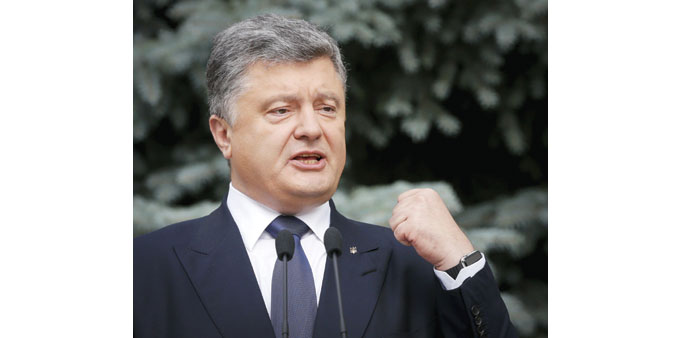AFP
Live
Ukrainian President Petro Poroshenko yesterday proposed constitutional changes designed to give broader powers to the regions, but failed to address the demands of pro-Russian fighters in the separatist east.
Poroshenko’s new vision of the ex-Soviet state’s basic law would trim presidential power over the provinces and extend to local towns and councils the right to oversee how their tax revenues are spent.
But it also refuses to add to the constitution the semi-autonomous status demanded by insurgency leaders who control an industrial edge of Ukraine that is home to 3.5mn people and accounts for a tenth of its economic output.
The westward-leading leader -- elected in the wake of the February 2014 ouster of Russian-backed president Viktor Yanukovych -- said the amendments would decentralise power but never turn Ukraine into a loose “federation” that Moscow has sought.
“Decentralisation would bring our political system closer to that of Europe,” Poroshenko said in a nationally televised address.
He argued the changes -- still to be approved by parliament -- would hand the regions “a vast amount of rights and financial resources that today are overseen by the president and the government.”
“Decentralisation safeguards us from authoritarianism and dictatorship,” said the 49-year-old former business baron.
“Decentralisation will be our civilised distinction from our neighbours in the Soviet camp,” he added in apparent reference to Russia and Belarus.
Militia-controlled parts of the mostly Russian-speaking Lugansk and Donetsk regions would like to see their semi-autonomous status spelled out in clearly-defined constitutional amendments that would be enormously difficult to reverse.
But Poroshenko’s draft -- due to be submitted to parliament later -- only makes reference to an existing piece of legislation that gives the separatists partial self-rule for an interim period of three years.
The rebels fear that the law could be revoked or suspended by a strongly pro-European parliament.
There was no immediate reaction from either Moscow or the separatist east of Ukraine to Poroshenko’s address.
Kiev’s Western allies have long pushed Poroshenko to limit the power in the hands of central authorities.
Washington believes regional rights would make politics more transparent and help break the corrupt bonds forged in the past two decades between billionaire tycoons and decision-makers.
But Moscow has argued that only a “federalised” Ukraine in which regions form their own diplomatic and trade relations with other nations can finally end a bloody insurgency that has claimed 6,500 lives in 15 months.
Nato should beef up its maritime arm in response to the rising threat from an increasingly “bold” and “aggressive” Russia, commanders said yesterdayt.
The 28-member defence alliance’s naval forces have in recent years focused on issues such as counter-terrorism and piracy, but speakers at a London conference said the group needed to prepare more to counter Russian military ambitions.
“Russian international maritime presence has grown significantly in recent years, specifically since the Ukraine crisis erupted in 2014,” senior Nato commander general Adrian Bradshaw, told a conference in London on Nato’s naval future.
“The Russian Federation is shadowing and presumably collecting intelligence from Nato nation naval units in the Baltic, the Atlantic, the Mediterranean and the Black Sea, using methods that can be considered bold and sometimes aggressive,” he said.
One area that Nato will focus on is how to better project maritime force on land using amphibious units and air power, said British vice admiral Peter Hudson.
“At the height of the Cold War in the 60s and 70s, the striking power of the US Navy, the delivery of large amounts of land forces to support Europe was quite a sophisticated art,” he said.

President Poroshenko proposes his project of changes in the constitution in Kiev yesterday.
